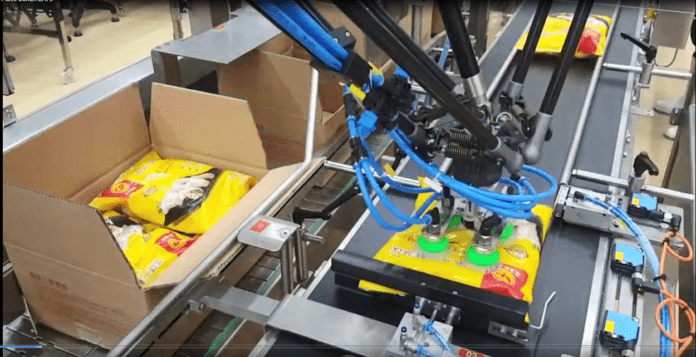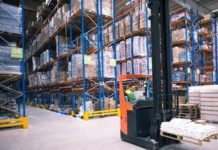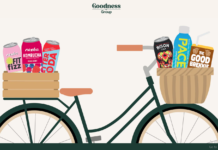Singapore-headquartered, Clearpack manufactures and supplies primary, secondary, and end of line packaging solutions for food, beverage, personal care, oil, chemicals, and pharmaceutical industries at what it claims are competitive costs. The company also offers software solutions for remote monitoring of packaging machines, which are very relevant in the current context of the Covid-19 pandemic. Founded in 1991, the company has a strong presence across South East Asia, India, China, Middle East, Europe, and Africa.
Clearpack’s range of solutions from primary packaging to end of line solutions extends to internal factory logistics (automatic guided vehicles). These are available as standalone machines or complete turnkey lines, including processes from stretch blow molding, rinsing, filling, capping, labeling for rigid containers, pouch, and sachet making for flexible packs to final shrink wrapping, case packing or palletizing.
Filling, capping and end of line solutions
Offering a wide range of linear and rotary rinsing, filling and capping solutions, Piyush Bhandari, area sales head of Clearpack, explains, “We are in this business for more than 20 years and decided to start our manufacturing about ten years ago. This decision has helped us to add value to our customers’ businesses as well as reinforcing our position as a turnkey solutions provider.”

The company offers electronic net weight, flow meter, and gravity-level filling technologies for various industries. In addition, it provides solutions for mechanical and electronic cappers for multiple types of closures, depending on the industry and its application.
Its off-line solutions’ portfolio includes case erectors, case sealers, mechanical and robotic case packing solutions, shrink wrapping machines, palletizing and pallet stretch wrapping machines.

Efficiency improvement using IIOT devices
Clearpack offers a system solution to monitor and improve the productivity of manufacturing lines on a real-time basis through mobiles or laptops. The solution includes invisible supervision on each machine, recording bottlenecks of production lines, and automatic alerts., and more. Real-time data is generated for the improvement of the efficiency of the production lines.

Explaining the system solutions, Bhandari says, “Clearpack has been supplying packaging machines for close to three decades. Now, in addition, we have a system to monitor the line performance of existing or new production lines and to improve overall line equipment effectiveness (OEE) while reducing maintenance costs by predicting and avoiding breakdowns. This has helped many of our customers to improve their OEE and reduce production downtime.”
Impact of the Covid-19 and upcoming trends
Amid covid-19 crisis, automation is a next big thing Bhandari admits that the pandemic has disrupted business on many fronts. Nevertheless, Clearpack is diligently following the guidance of local public health authorities and other relevant government agencies in all the countries it operates in. “Our manufacturing plants are practicing these policies, and our field-service teams are working on-site, or remotely, to support the market,” adds Bhandari.
According to him, the FMCG sector will be fundamentally stable during Covid-19 and beyond that. “We will see an increasing movement of the FMCG sector to online channels of retail. Moreover, with the economy being in a regressive state for the near future, there would be a need for smaller volumes that come at a lower price point.”
Automation is the next trend
To meet market demand, manufacturers need to scale up their production volumes. However, to do so in an environment with a scarcity of workforce, and with tight regulation of human movement is not easy. According to Bhandari, in this scenario, automation of production lines could be a possible solution. “We also expect to see an increased move towards automation of packaging lines, and a large number of companies are investing in solutions to monitor machine performance in real-time to improve their productivity,” he believes.
“The industry needs to shift in a way to be flexible and on-demand driven. Production lines will require quicker change over between different products so that the ‘planned downtime’ is minimized. Automation can help to achieve this. Manufacturers also need to get more out of their existing production lines by improving their OEE. A few percentage gains in these can reduce overall cost while delivering higher volume,” Bhandari states.
According to him, the pandemic has created a self-evaluation by businesses on how easily they can adapt to changes. “The world will not be the same anymore, and the same applies to the packaging industry as well, whether it is about the policies in place for operating factories with stricter guidelines on fewer people, or meeting the demands by the market for new products at short notice. Ironically, teams need to work together even more closely, on virtual platforms, to manage these changes,” he concluded.
IndiFoodBev — authentic, impactful and influential
An English-language food and beverage processing and packaging industry B2B platform in print and web, IndiFoodBev is in its third year of publication. It is said that the Indian food and beverage industries represent approximately US$ 900 billion in revenues which implies more than 20% of the country’s GDP. Eliminating the wastage on the farmside can help to deliver more protein to a higher number of the population apart from generating sizable exports. The savings in soil, seeds, water, fertilizer, energy and ultimately food and nutrition could be the most immense contribution that country is poised to make to the moderation of climate change.
To improve your marketing and grow sales to the food and beverage processing and packaging industry, talk to us. Our research and consulting company IppStar [www.ippstar.org] can assess your potential and addressable markets in light of the competition. We can discuss marketing, communication, and sales strategies for market entry and growth.
Suppliers and service providers with a strategy and budget for targeted marketing can discuss using our hybrid print, web, video, and social media channels to create brand recognition linked to market relevance. Our technical writers are ready to meet you and your customers for content.
The second largest producer of fruit and vegetables in the world is continuously expanding processing capacities and delivery systems with appropriate innovative technologies. We cover product and consumer trends, nutrition, processing, research, equipment and packaging from farm to thali. Get our 2025 media kit and recalibrate your role in this dynamic market. Enhance your visibility and relevance to existing markets and turn potential customers into conversations. Ask for a sample copy of our bi-monthly in print or our weekly IndiFoodBev eZine each Wednesday.
For editorial info@ippgroup.in — for advertisement ads1@ippgroup.in and for subscriptions subscription@ippgroup.in
Naresh Khanna – 10 February 2025
Subscribe Now












